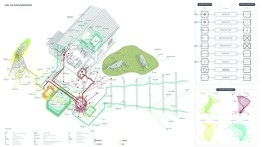Visiting Lecture | Lydia Kallipoliti: Architecture of Closed Worlds
Thursday, September 20, 2018, 6:30 - 8pm

Feedback Drawing by Temitope Olujobi and Lydia Kallipoliti for the Earth Workshop by Glenys Crump, Peter Crump, Chrissie Raven, Brett Bailey, Erik Raven, Bernard Seal & Stefan Szczelkun, in Whales, UK, 1973.
What do outer space capsules, submarines and office buildings have in common? Each is conceived as a closed system: a self-sustaining physical environment demarcated from its surroundings by a boundary that does not allow for the transfer of matter or energy. Contemporary discussions about global warming, recycling and sustainability have emerged as direct conceptual constructs related to the study and analysis of closed systems. From the space program to countercultural architectural groups experimenting with autonomous living, The Architecture of Closed Worlds documents a disciplinary transformation and the rise of a new environmental consensus in the form of a synthetic naturalism.
Lydia Kallipoliti is an architect, engineer and scholar, currently an Assistant Professor of Architecture and the Director of the Master of Science program at Rensselaer Polytechnic Institute. She holds a Diploma in Architecture and Engineering from AUTh in Greece, a SMArchS from MIT and a PhD from Princeton University.
Kallipoliti is the founder of EcoRedux [www.ecoredux.com], an innovative online open–source educational resource and ANAcycle thinktank [www.anacycle.com], a research and writing practice. She is the editor of a special issue of Architectural Design in 2011, and the author of the book The Architecture of Closed Worlds, Or, What is the Power of Shit (Lars Muller, 2018), as well as the History of Ecological Design for Oxford English Encyclopedia of Environmental Science. Her work has been exhibited in a number of international venues including the Venice Biennial, the Istanbul Design Biennial, the Shenzhen Biennial, the Royal Academy of British Architects, the Onassis Cultural Center and the Storefront for Art and Architecture in New York. Kallipoliti is the recipient of an honor at the 14th Webby Awards, grants from the Graham Foundation, and the New York State Council for the Arts, an Honorable Mention at the Shenzhen Biennial, a Fulbright scholarship, and the ACSA annual award for Creative Achievement. Prior to RPI, she has taught at Columbia University GSAPP, Pratt Institute, Syracuse University and the Cooper Union.
This event is open to current Cooper Union students, faculty and staff. Room 315F.
View the full Fall 2018 Lectures and Events List.
Located at 7 East 7th Street, between Third and Fourth Avenues




